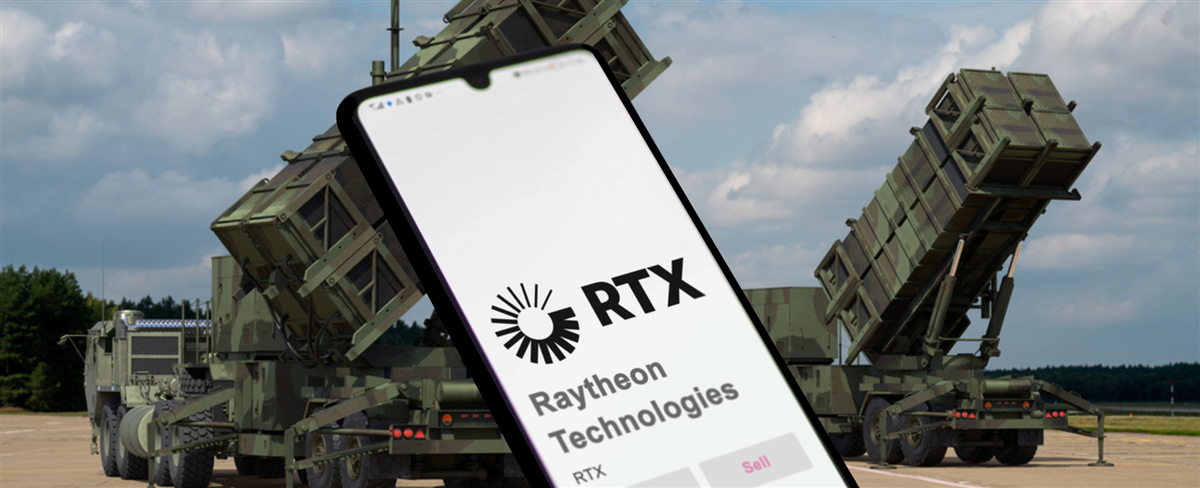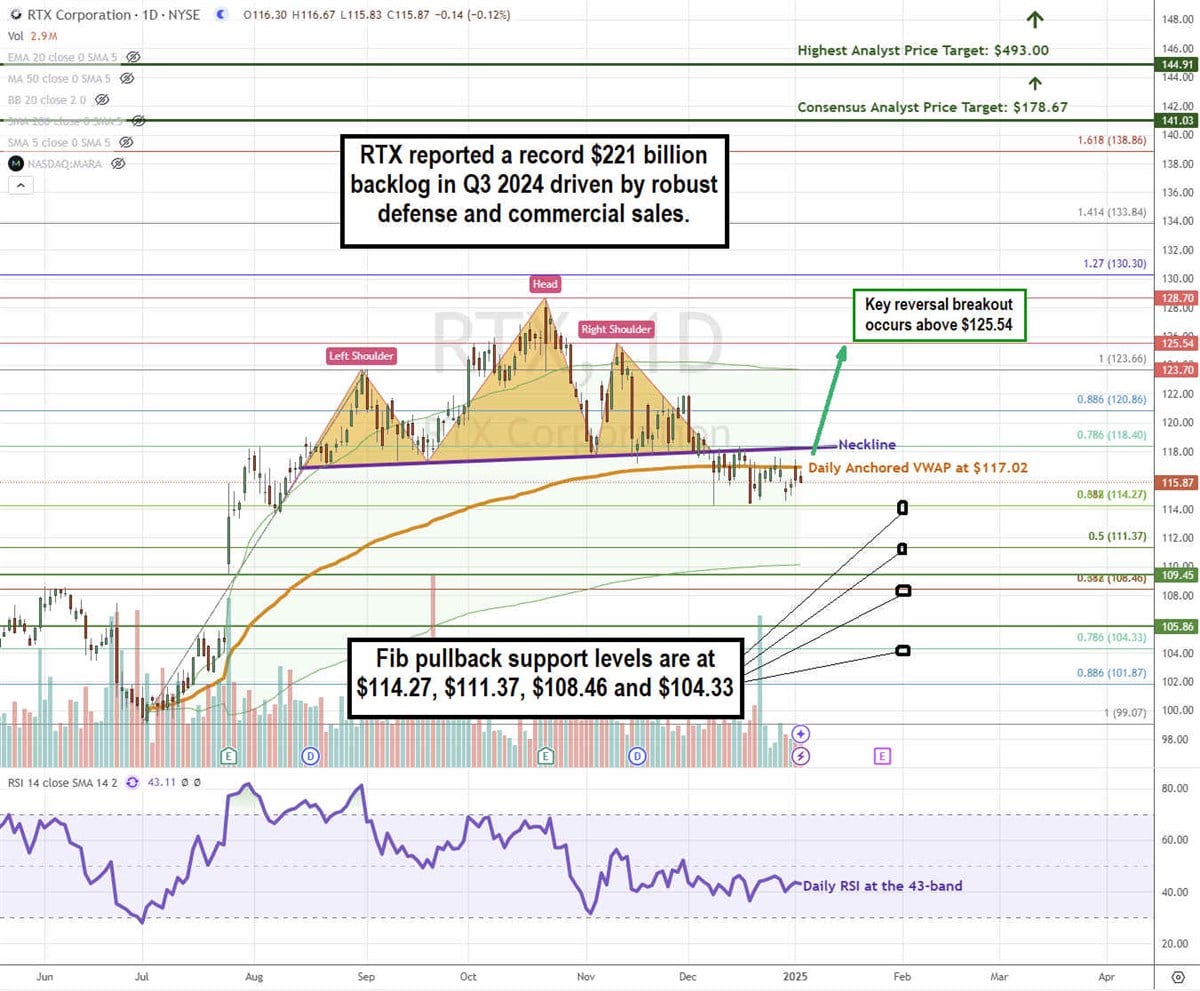
Defense stocks have been in a downdraft heading into the new year. President Trump’s intent to de-escalate geopolitical conflicts and end the war in Ukraine with funding cuts is causing concern throughout the aerospace sector. The world's largest defense contractor, Lockheed Martin Co. (NYSE: LMT), shares tumbled 22% in just over two months from its high of $618.95 on Oct. 21, 2024, to $481.82 on Jan. 3, 2025.
The B-2 stealth bomber manufacturer Northrup Grumman Co. (NYSE: NOC) also saw its stock crumble 15.8% in three months from its $555.57 swing high on Oct. 1, 2024, to $467.82 on Jan. 3, 2024. Aerospace giant Raytheon Technologies Co. (NYSE: RTX) stock has weathered the sell-off better, dropping just 10% from its swing high of $128.70 to $115.83 during the same period. It’s no coincidence that Raytheon is holding up better than its peers. Thanks to a broader diversification of products, Raytheon may actually be the best defense and aerospace stock of 2025.
Diversification Is the Best Defense
Raytheon operates as three divisions. Here’s a breakdown of the individual companies and segments:
- Pratt & Whitney manufactures aircraft engines for military and commercial clients. Some of their key offerings include the F117 and F135 engines, gear turbofan (GTF), and maintenance, repair, and overhaul services. This segment posted Q3 2024 revenue growth of 14% YoY to $7.24 billion, generating operating profits of $557 million. Military sales rose 20%, while Commercial sales rose 9% YoY.
- Collins Aerospace is the aviation systems aerospace segment that produces avionics, aircraft interiors, mission systems, and landing gear. This segment posted Q3 2024 sales of $7.1 billion, up 7% YoY. Operating profit was $1.1 billion. Sales growth was driven by a 14% life in the Military and a 9% lift in the commercial aftermarket.
- Raytheon consists of its Raytheon Missiles and Defense (RMD) and Raytheon Intelligence and Space (RIS) segments, which generated sales of $6.4 billion, down 1% YoY. The higher volume on land and air defense systems was offset by the sales of its Cybersecurity, Intelligence, and Services business. The segment reported operating profit of $647 million, up 16% YoY.
The Cumulative Effect Produced Solid Third Quarter 2024 Results
Raytheon reported Q3 2024 EPS of $1.45, beating consensus estimates by 11 cents, as revenues rose 6% YoY to $20.09 billion, beating $19.84 billion consensus analyst estimates. The company added $25 billion in defense and $11 billion in commercial orders to grow its backlog to a record $221 billion with a strong book-to-bill ratio of 1.8. For every $1 of product billed and shipped, Raytheon received $1.80 worth of new orders.
Defense Systems Is a Cash Cow
Raytheon sells some of the planet's most advanced air and missile defense systems. Raytheon states that 19 nations use their Global Patriot missile defense system, which consists of radar, command-and-control (COC) technology, and interceptors. The Patriot air defense system is designed to detect, identify, and defeat tactical ballistic missiles, drones, cruise missiles, and advanced aircraft. These are used during both times of people and geopolitical tension and have been constantly maintained, enhanced, and upgraded for the past 20 years.
Raytheon supplies critical components for Lockheed Martin’s THAAD (Terminal High Altitude Area Defense) air and missile defense systems used by the United States, Israel, Saudi Arabia, and the United Arab Emirates. THAAD is a more expensive and specialized system with a much smaller user base.
The Deals Keep Rolling In
Raytheon continues to procure contract awards. On Jan. 3, 2025, Raytheon announced a $946 million military supply contract to supply Romania with additional Patriot air and missile defense systems. On Dec. 23, 2024, Raytheon was awarded a $946.45 million modification to the U.S. Army contract for Patriot production software, hardware, and services. On Dec. 19, 2024, Raytheon secured a $401 million U.S. Navy contract and a $282 million U.S. Army contract. On Dec. 5, 2024, Raytheon won a $590 million follow-on contract with the U.S. Navy for the production of its Next-Generation Jammer Mid-Band system. These awards add to its record $221 billion backlog reported at the end of October 2024.
RTX CEO Chris Calio stated, "Demand across our portfolio, particularly within commercial aftermarket and defense, remains robust and gives us the confidence to raise our full-year outlook for adjusted sales and adjusted EPS again."
Raytheon Has More Upside With Analyst Price Targets
The upside price target winner is Raytheon, with a consensus price target of $178.67, implying a 54.2% upside and its highest analyst price target sits at $493.00, up 326.6% higher. Comparatively, Lockheed Martin stock only has a 25.64% upside, as its consensus analyst price target is $605.36. Northrup Grumman stock only has an 18.26% upside with a consensus analyst price target of $553.27. Raytheon Technologies has eight analysts' Buy ratings and six Hold ratings.
RTX’s Daily Head and Shoulders Pattern Reversal
A head and shoulders pattern is comprised of three tops connected by a neckline support. The left shoulder is the first top, which reverses to the neckline support and bounces to the second and highest top, known as the head. Shares fall back down to the neckline support before bouncing to a lower top called the right shoulder. Shares fall back down to the neckline again. The breakdown occurs if the stock collapses through the neckline after forming the right shoulder. A reversal triggers if the stock can surge back up through the right shoulder peak.

RTX formed a head and shoulders breakdown but found support at the $114.27 fib. The breakdown has been shallow so far, which bodes the potential for a reversal if RTX can bounce through its daily anchored VWAP at $117.02 and the neckline resistance at the $118.40 fib and through its right shoulder peak at $125.54. The RSI is rising and has been chopping sideways around the 43-band. Fibonacci (Fib) pullback support levels are at $114.27, $111.37, $108.46, and $104.33.
Actionable Options Strategies: Bullish investors can consider using cash-secured puts at the Fib pullback support levels to buy the dip. If assigned the shares, writing covered calls at upside Fib levels executes a wheel strategy for income on top of its 2.17% dividend yield.
